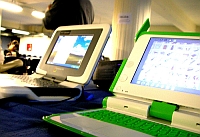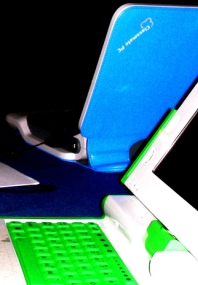Some time ago, I, Nicola Ferralis, proposed that kids testing different solutions has been the best way to assess the best educational platform. With this perspective in mind, I often ask myself: What makes a good review for a tool designed to educate children in the developing countries? Who is supposed to be a perfect candidate for such a review? A geek? An educator? Are those the people that the manufacturer should listen to?
I found recently a review over at Linux.com of the Classmate PC running a custom version of Mandriva Linux. I find it interesting because it shows how a mindset can produce a review that is effectively appealing to your peers (geeks in this case), but it falls short of addressing the real issues of using this device in a developing country. Let me then show a few examples:
"Intel says it is a "rugged learning device." "After five days with three active kids, the Classmate PC still works, and shows relatively few signs of wear -- just a little dirt and an unidentified food stain of some kind, probably ketchup, on the vinyl cover, which along with a thicker than usual plastic case provides extra protection from kids. The keyboard is not sealed, but we didn't need to clean it -- it wasn't that dirty."What is wrong with this picture? The use of the Classmate for only few days already shows signs of wear. The author considers that acceptable, since this is probably common on any conventional laptop. Furthermore, the fact that the keyboard is not sealed is not considered as a strong negative point ("It wasn't that dirty").
So while this laptop can be considered quite robust as a replacement for a conventional laptop, it is definitively not appropriate for a kid, specifically in the developing country. An unsealed keyboard is a sure guarantee that dirt, dust, sand, soot will eventually get in. But then this is not the environment a geek is usually accustomed to. In fact:
"We ran through the battery three times, but Classmate was running most of the time we had it; the battery life was pretty good, lasting at least two hours at a time."Pretty good? Two hours is the lower limit for a conventional laptop. In a small town with scarce availability of power, that is not really a good performance, which is symptomatic of poor power management in the Mandriva Linux OS. A geek will not be aware of such limitations, since most of the time he will be able to find some sort of electric connection.
"The Classmate seems durable and easy to use. I would recommend it for the same type of computer user I recommend desktop Linux to: a non-power user who does light-duty surfing, email, and word processing or spreadsheets, basic wired Internet, and no multimedia stuff. Anything more than that is going to require tech support."Wired-networking? Aren't those laptops? It seems that the classmate does not inspire collaboration, which is crucial in a learning environment. As we all know word processing and spreadsheets are useful applications per se, but not necessarily the greatest educational tools.
One point is quite interesting, however, although the emphasis is placed over common functionality instead of kids accessibility.
The first snag was having to log in as root to check the system configuration because the Classmate wouldn't log on to the network. Something tells me most elementary and high school teachers with nothing but Windows experience aren't going to get that. The second snag was that I did not know the root password.Not providing the root password is a bad idea, and this is why: you, as a user, won't be able to hack your system. You can only use it, with limited possibility to see how the internals work. This is the exact opposite of the XO, where not only the view of the source is encouraged, but hacking is possible too.In fact, I had no login information whatsoever, and Mandriva had been configured to automatically log me in. I contacted Mandriva tech support, since Mandriva had provided the OS image to Intel, and got the root password later that day. Normally, Intel will provide end user tech support on Classmates.
The smart use of Python, allows to have a system that is fully transparent to the user. From an educational perspective this is actually great, both for the kids and the teachers, since it allows them to use the system with a greater degree of freedom. A locked down solution is everything but inspiring creativity.
The Mandriva solution is not very different from having Microsoft Windows on it, since Intel is in both cases controlling what should go on the laptop. Hence this is a very closed laptop. Of course, none of this is mentioned in the article, other than reporting the inconvenience, from a geek perspective, not to be able to have root access.
What can we learn from this review? In designing this laptop, Intel basically took a top-down approach, scaling down a conventional laptop. For this reason, this system is appealing to a conventional audience, as we read from the review, but it is definitively untested as a solution in schools in developing countries.
The OLPC is following a bottom-up approach, in which everything is redesigned and rethought to be suitable for kids. This platform is also untested, but its openness may constitute really a spark for developing a platform that from an educational standpoint could bring really what is needed.
A good place to start for both the Intel and OLPC is in have good testing and side-by-side reviews done from the end users, the kids. For once, their contribution would be far more useful than that from geeks.





Nicola,
thanks for reviewing the reviews:)
I guess it is no coincidence that the Intel Classmate is not as open as the OLPC XO. It would not make sense for Intel to copy all product features of the XO that suits educational administrators with a modern progressive point of view. Intel rather tries to complement those features aiming at the conservative cautious types of those administrators. This way they can benefit from the market that the XO does not cover. If they aimed at the same market as the XO then Intel would have to top the XO's revolutionary features which would be much more difficult than concentrating on a evolutionary approach. This is smart marketing of Intel. They are real professionals on that.
This uncovers one of OLPC's weaknesses. OLPC has been very successful to convince and even create enthusiasm in the progressively thinking people and educators. But they failed so far to convince the conservative, down to earth, fact oriented people. Maybe they should think up a way to serve those perspectives as well.
My concept of "bottom-up design" involves testing features with kids and working from the results of the tests to evolve the design. So far as I know, neither Intel nor OLPC has taken this approach.
I know, OLPC will say they are doing it now. They should, but the drive to production continues on a forced march (I refer to the schedule that was recently published). Pilot testing was first ridiculed, but now the concept is grudgingly accepted.
If pilot testing is occurring, what is the methodology, the data and the conclusions? Intel won't give these out, being a private corporation, but why shouldn't OLPC do so?
Nicola is to be commended for observing the biases that creep into analysis, but he turns his examination into a defense of the XO design. Please, let's separate analysis and argumentation (to the greatest extent possible, at least).
My quarrel with OLPC has never been about the design, but was based upon the process by which the design was created - quite a "top-down" approach when you consider the users' non-involvement.
Lee,
you are absolutely correct. My praise for the XO is strictly concerning the current design, not the testing nor the implementation on the field. The design has the child in mind, while the Classmate hasn't at all. In other words, the XO seems, from a design standpoint a device much more suited than the Classmate.
However testing is crucial, as I said before:
http://www.olpcnews.com/software/operating_system/windows_xp_olpc_testing.html
So I am all for testing the device, better if done with properly and scientifically. And while they are at it, use some educational consultants to help them sort out the feedback. For sure that is something they are not doing at the moment.